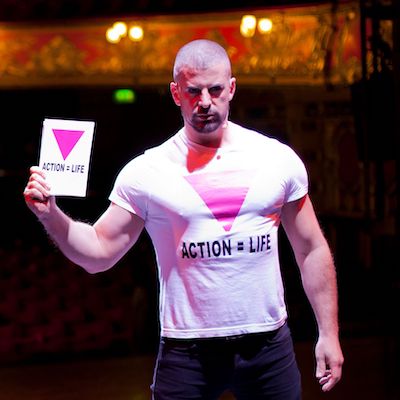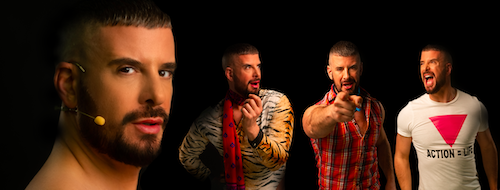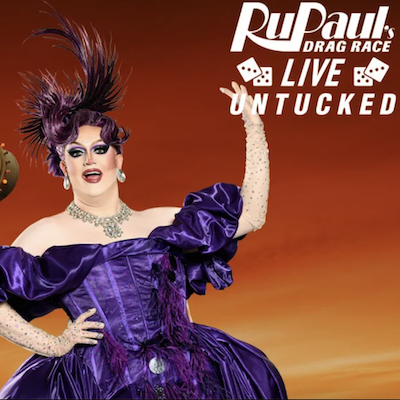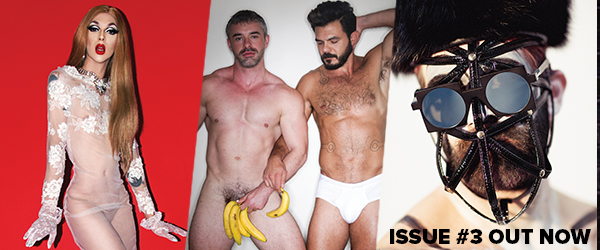
The last time we spoke to creator & performer, Alexis Gregory, he was performing his play Sex/Crime alongside Jonny Woo. Now Alexis is going it a lone in Riot Act, a one-man-show which sees him take on three different roles, each inspired by real life stories as told to Alexis by a Stonewall survivor, a radical drag artist and an AIDS activist.
Having performed it in London’s West End and touring it across the country, today sees Alexis launch the online stream of Riot Act to celebrate LGBT History Month 2022. Riot Act will stream, on demand, throughout February and tickets can be bought at www.stream.theatre now. Alexis tells Loverboy about taking Riot Act online and which period has meant the most to him in LGBT History.
Hi Alexis, the last time we spoke it was the amazing comic thriller Sex/Crime. What events or inspiration took you in the direction of writing Riot Act after writing Sex/Crime?
I’ve always been interested in modern queer history and queer lives, and exploring, in my work, taboo subjects, truths not normally explored on stage, apparent contradictions, flawed characters, and lives lived on the edge. All of my work explores social and political themes, mostly via the queer lens, and with lots of humour, bite and subversion too, and is always multi-themed too. Riot Act explores so much more than the Stonewall riots, radical drag, and AIDS activism. At the time, it seemed like the perfect next step for me. Developing the piece over 2017, premiering it in 2018, followed by a West End gala performance, two UK tours, and a mini-tour last summer, I’d have never thought that in 2022, I’d be streaming it online to a possible global audience.
In creating the play, you interviewed three different LGBT figures. How did you find them? I imagine it would have been emotionally intense process…
The piece was in a way inspired my Michael, my ‘Stonewall character’ who was there on the nights of the riots, at the tender age of seventeen, and on his first night out in NYC. He approached me and offered me his story, and I knew I had to find the right vehicle for it. Lavinia and Paul were my two choices to bring the story over the Atlantic to London, for the 1970’s onwards section. With them, we look at two other periods in queer history. I’d say one; the response to the AIDS virus, more widely recognised than the other, Lavinia’s experience in the underground drag squats of 1970’s London, and beyond. Both Lavinia and Paul, were my only second and third choices of subject for the play, and both, luckily and immediately said ‘yes’. There was never a fourth possible interviewee. I got my dream team. The whole process of interviewing the guys was fascinating. I found myself shaping the piece in my head, as I questioned them, asking for more information on what was dramatically interesting, what would be surprising for the audience, was shocking, what was funny, for example. All of three of the guys were amazing in the interviews, and amazing since. Last time I saw Lavinia as the online recording pre-production started, I thanked Lavinia again, and Lavinia said, ‘Don’t thank me. You’re the mug that’s gotta get up and do it again’. I loved it.
You play three different characters in the one-man-show. Is it hard to switch personality types within seconds?
Surprisingly no, even when filming the digital reimagining, when as standard for filming, lots was shot out of sequence, and we jumped around, and between characters, way more than I would ever do on stage. This isn’t to say that I am complacent with the show, or coast through it. The opposite. Each time I re-do it, I have to relearn it, and I always find new meanings in my own script each time. The filming was very hard, I had to completely re-shape my performance for the screen, and I worked really hard on preparing to do so in the lead up. I took nothing for granted. The filming days were gruelling, for me and the crew and creative team, but we got there. Producing and filming this has been one of the hardest things I’ve ever done.
You worked with the legend that is Rikki Beadle-Blair, who directed Riot Act. How did you both working together come about?
I first worked with Rikki around 2004, when I was a struggling twink actor. This was a very different time to be an ‘out’ actor, and Rikki wrote a great, gay role for me in a play, and it was the first time I felt able, and safe enough, to meld my professional and personal life, and not feel completely humiliated by the whole experience. I have worked on many of Rikki’s plays and films over the years. Rikki, along with John R Gordon, of Rikki’s Team Angelica company, encouraged me to write and directed my first play Slap, which first appeared in 2012. This was my first platform as a writer. I knew Rikki was the right director to bring onto Riot Act, not just because we had a good working relationship, or just because of his unparalleled legacy in truthfully exploring queer lives on stage and screen, but also because I felt safe with Rikki. A solo show like this can be pretty terrifying. The first night I went on stage at the King’s Head, I had no idea if I would remember the words and make it through to the end. Luckily, I did. I think a lot about things Rikki has told me, as I navigate my career, working in this tricky industry, and sometimes personally too.
Riot Act looks at the last six decades of LGBT History. Which decade covered do you think has been the most significant for LGBT History?
I always feel that, from a gay male perspective, which of course filters through to and encompasses other parts of the community, the landmark modern moments are the pre-Stonewall era, Stonewall, post-Stonewall, i.e. sexual-liberation and pre-AIDS, and then AIDS, and now this current era we live in. Paul, one of the characters in the play, says in the piece, that ‘AIDS made us visible’ and that so many of our current ‘freedoms’ are a direct result of that. Maybe I need to say, the ‘80s into the ‘90s, were therefore our most pivotal years. I wonder how this current era will be remembered; as the LGBTQ+ community, and indeed the wider world, reshapes itself to accommodate the rapid social and political changes, unfolding around us, and that we are navigating; close to home, and further afield too.

Riot Act is being screened online as part of LGBT History Month 2022. Who do you feel is an overlooked figure in LGBT History?
I’m going to say Doctor Joseph Sonnabend, and I am writing this, one day after the year that marks the anniversary of his death. Joe was, what I call, ‘a great man’; one of the very first people to ‘discover’ the AIDS virus in 1979. The New York Times famously didn’t report it until 1981, which is when its first started to enter the wider public consciousness. Joseph’s life, career and achievements are too long to list here, but briefly, he and two colleagues also came up with the modern notion of what modern safe sex ‘was’, obviously a pivotal contribution to the landscape of the time. He also fought, and won, the first ever piece of AIDS-related discrimination in regard to his landlords not wanting his patients to visit his practice, due to the supposed ‘AIDS risk’ to others passing through the building. It was a landmark case. I interviewed Joe on and off since 2019, and over the first two lockdowns via Zoom, as I am working on a play about his life called Instrumental. I will continue to do so. I have chosen Joe as an ‘overlooked’ figure, but of course he was very widely respected in his field and is literally responsible for many gay men, from that generation, still being with us in 2022. I often think of Joe too, and the things he told and taught me too.
Seeing as we are named after the biggest-selling single of 2001, last time you told us ‘The Roof’ was your favourite Mariah Carey song. Do you think Mariah will ever release any non-Christmas music again?!!!
On a personal note, I’m happy for Ms Carey to ONLY release Christmas songs for the rest of her career. I love Christmas albums, and I tend to start on Diana Ross’ Christmas album around June each year. I’m totally here for yearly Mariah re-releases of new versions of ‘O Holy Night’, re-recorded each year, in an ever-descending key. To be clear, I love Mariah’s voice as it matures. All of the above, would be, to me a sweet sweet fantasy, baby…..
Riot Act is available to stream now until the end of February.
Photos by Holly Revell.









